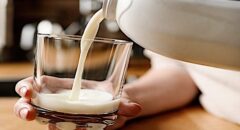 Sleep plays a critical role in looking and feeling your absolute best.
Sleep plays a critical role in looking and feeling your absolute best.
Getting a good quantity (i.e. 7-8 hours) of high quality uninterrupted sleep:
• Assists in controlling appetite and can reduce the risk of overeating
• Promotes calorie-burning muscle mass
• Allows for body repair and muscle recovery
• Improves energy
• Reduces stress
• Lowers risk to certain chronic illnesses
There are certain foods (and beverages) that promote high quality sleep. Foods that contain (or promote) tryptophan aid in the production of serotonin and melatonin. These chemicals have sleep-inducing effects. Foods containing melatonin, the chemical that regulates sleep, can also assist in getting a good night’s sleep.
To borrow a line from The Eurythmics, “Sweet Dreams are Made of These”:
• Warm Milk: contains tryptophan, which helps in the production of serotonin and melatonin. Additionally, calcium helps the brain use tryptophan to manufacture melatonin.
• Low-Fat Yogurt: Good source of sleep-inducing tryptophan and calcium, which helps the brain use tryptophan to manufacture melatonin.
• Banana: Solid source of tryptophan. Additionally, the carbohydrates contained in a banana helps bring tryptophan to the brain to aid in the production of serotonin.
• Dried tart cherries: Contain melatonin.
• Popcorn: The carbohydrates in popcorn helps to bring tryptophan to the brain to produce sleep-inducing serotonin. When preparing popcorn, use iodized sea salt (which promotes thyroid health) or another spice (such as turmeric). Avoid cheesy or buttery popcorn.
• Tart cherry juice: A good source of melatonin.
• Chamomile tea: Contains no caffeine and helps the body to relax. Sweeten with honey instead of sugar.
Avoid eating big meals 2-3 hours before bed. The energy required to digest a big meal can disrupt sleep. Certain beverages such as caffeine, sugary drinks and alcohol can also impede a good night’s sleep. Instead, try one of the above foods or beverages as a light snack about an hour before bedtime.
Sweet dreams.






